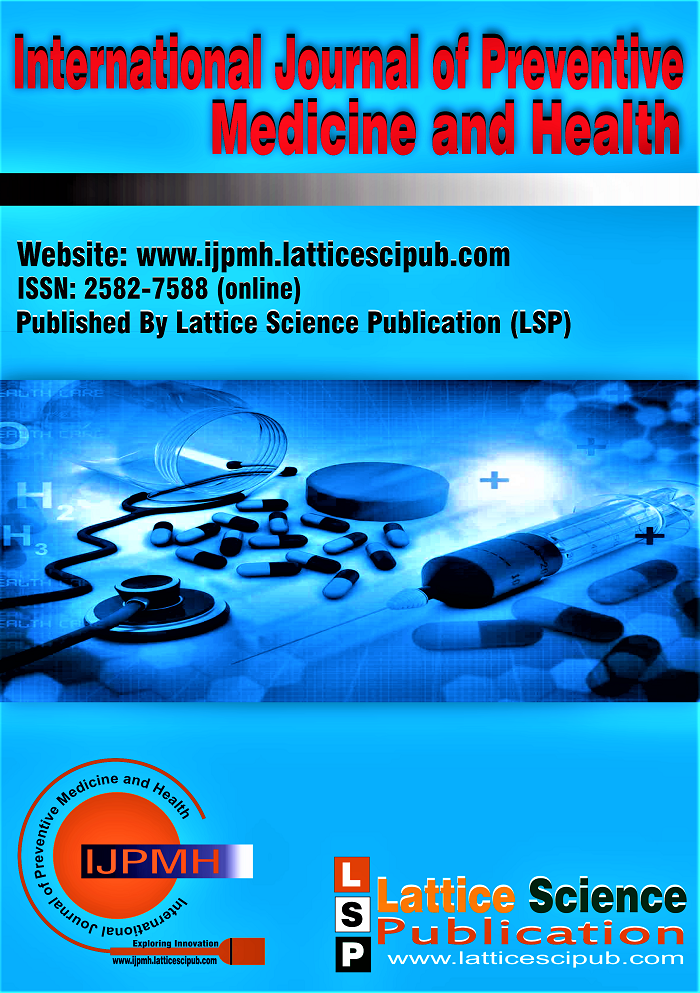Awareness and Perception of Green Hospital Concept Among the Healthcare Professionals in Jalandhar
Main Article Content
Abstract
The integration of sustainable practices with healthcare improvements takes place through hospitals focusing on decreasing the environmental impacts of healthcare facilities. Healthcare professionals often fail to effectively implement green hospital practices due to a lack of awareness about their potential benefits. An investigation has been conducted to examine how Jalandhar healthcare professionals perceive and implement green hospital practices, as well as their awareness levels and the challenges they encounter in practice. The research demonstrates why healthcare workers in Jalandhar require standardised education, together with institutional backing that supports Sustainable Development Goal 13 (Climate Action). Healthcare institutions generate substantial environmental contamination due to their excessive use of energy resources and the production of large amounts of waste. The adoption of sustainable practices in green hospitals leads to better healthcare outcomes, along with stronger environmental resilience, as they focus on energyefficient designs, sustainable building standards, and proper waste management. Green hospitals are becoming increasingly common worldwide, yet their adoption remains relatively low in India. The present efforts primarily focus on waste management solutions and energy conservation practices, but sustainable practices require further development. Healthcare professionals throughout Jalandhar received an assessment through a structured questionnaire regarding their knowledge levels and perceptions of green hospital installation, as well as the implementation barriers they face. The survey inquiry collected information about demographics, as well as participants' knowledge levels of environmental hospital practices and their perceived advantages, and their organisations' support deficiencies. Medical staff from various hospitals, along with nursing personnel and administrative personnel, participated in the survey. Most healthcare workers demonstrate knowledge about green hospital practices; however, they often struggle with insufficient support and training from their institutions. Key results include: Among the surveyed medical staff, only 65 per cent demonstrated awareness about energy conservation, yet 40 per cent. The per cent grasped complete green hospital systems. Seven out of ten healthcare providers (75%) showed they needed training on sustainability practices, yet they had not received any formal instruction. The main obstacles cited by hospital personnel included [1] 55% feeling organizations lacked support, [2] 48% reporting financial limitations, and [3] 42% experiencing resource scarcity. The complete realization of green hospital benefits requires stakeholders to establish training programs as their top priority. The training of green hospitals must become an obligatory component in healthcare education programs through government policies. Sustainable healthcare practices need institutional support, which enables the provision of essential funding and performance-based policies [4]. Numerous international healthcare facilities have proven how green hospitals cut costs and create better patient results [5]. Green infrastructure implementation in hospitals of developed nations generates both 30% less energy expenses and better patient experiences [6]. India needs to develop customized green hospital strategies to gain similar advantages as other nations have achieved. Healthcare institutions should integrate the green hospital concept into their accreditation standards, together with performance evaluation procedures. The advancement of sustainable healthcare practices depends heavily on three essential elements: improved awareness, organized training programs, and company-wide support and dedication. The research will support future investigations into practical strategies for implementing green hospital practices throughout India.
Downloads
Article Details

This work is licensed under a Creative Commons Attribution-NonCommercial-NoDerivatives 4.0 International License.
How to Cite
References
Azar, F. E., Farzianpour, F., Foroushani, A. R., Badpa, M., & Azmal, M. (2015). Evaluation of green hospital dimensions in teaching and private hospitals covered by Tehran University of Medical Sciences. Journal of Service Science and Management, 8, 259–266. DOI: https://doi.org/10.4236/jssm.2015.82029
Bharara, T., Gur, R., Duggal, S. D., Jena, P., Khatri, S., & Sharma, P. (2018). Green hospital initiative by a North Delhi tertiary care hospital: Current scenario and prospects. Journal of Clinical and Diagnostic Research, 12(7), DC10–DC14. DOI: https://doi.org/10.7860/JCDR/2018/34360.11758
Chen, L., Wang, Y., & Zhang, H. (2020). Challenges in Green Implementation. Journal of Environmental Health, 45(2), 100-115. https://gyatk.com/challenges-of-green-technology/
Gupta, R., & Das, M. (2022). Awareness and Adoption of Green Hospitals in India. Indian Journal of Healthcare Management, 11(3), 45-60. DOI: https://doi.org/10.1007/s13312-023-3041-8
Hamod, R. M., & Majeed, S. A. (2021). Effect of green human resource management practices in enhancing sustainable competitive advantage: An exploratory study of a sample of hospitals. PalArch’s Journal of Archaeology of Egypt/Egyptology, 18(7), 1169–1189. DOI: https://doi.org/10.1007/s11356-020-11307-9
Konyaloglu, A. K., Beldek, T., & Camgoz-Akdag, H. (2022). Prioritisation of green hospital attributes using a fuzzy analytic network process (F-ANP)-based method. In Intelligent and fuzzy techniques for emerging conditions and digital transformation (pp. 303–312). Springer, Cham. DOI: https://doi.org/10.1007/978-3-030-85626-7_36
Kumari, S., & Kumar, R. (2020). Green hospital - A necessity and not an option. Journal of Management Research and Analysis, 7(2), 46–51. DOI: https://doi.org/10.18231/j.jmra.2020.010
Sharma, P., & Singh, R. (2021). Barriers to Sustainable Healthcare in India. Sustainability in Healthcare, 7(4), 210-230. DOI: https://doi.org/10.1016/j.samod.2021.100001
Suwasono, E., Suman, A., Soemarno, & Yanuwiadi, B. (2013). Creating a green hospital concept through the management of non-medical waste. International Journal of Advances in Engineering & Technology, 6(5), 1988–1994. http://www.ijaet.org/media/5I17-IJAET1117405_v6_iss5_1988-1994.pdf
Yuan, W., Yang, M., Liu, D., Fu, X., Yu, L., & Wang, K. (2024). Evaluation of the applicability of hospital-affiliated green spaces to patient recovery using the entropy weight method and grey relational analysis. Frontiers in Public Health, 12, 1362884. DOI: https://doi.org/10.3389/fpubh.2024.1362884





